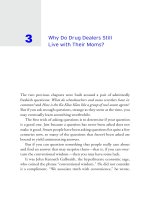Why do americans and canadians celebrate labor day
Bạn đang xem bản rút gọn của tài liệu. Xem và tải ngay bản đầy đủ của tài liệu tại đây (41.42 KB, 5 trang )
Why do Americans and Canadians celebrate Labor Day?
Discuss.
a) Do you know the history about this day?
b) Which things do you tend to do during this day? How long do you wait for it?
c) Apart from a day off to work or school, what do you think is the biggest
benefit of Labor Day?
Listening. Choose the best option.
1) Labor Day is celebrated in America and Canada on the first Monday in:
AMay
BSeptember
COctober
DFebruary
2) The first American Labor Day was celebrated in which city and year:
ABoston
BWashington
CPhiladelphia
DNew York
A 1894
B 1882
C 1872
D 1892
3) Many countries celebrate International Workers Day on:
AMay 1
BSeptember 1
CJuly 4
DApril 1
4) The American President who signed Labor Day into law in 1894 was:
AAbraham Lincoln
BTheodore Roosevelt
CGrover Cleveland
DJohn F. Kennedy
5) The American federal law ending child labor was signed into law in 1938 by
President:
AGrover Cleveland
BTheodore Roosevelt
CFranklin D. Roosevelt
DAbraham Lincoln
6) What it was about the American federal law? Which was the reason?
7) List three changes that happened as a result of Labor Day.
8) Why did they change the Labor Day date?
Listening. Fill in the blank.
The first American Labor Day was celebrated in ____________ on
______________, as thousands of workers and their families came to Union
Square for a day in the park. It was not a ___________ ____________, but
had been organized by ____________ to honor workers and their hard efforts
with a _________ __________ of __________, halfway between July 4 th and
Thanksgiving. There were picnics and a parade, but there were also protest.
The workers had ____________, not just to rest and celebrate, but to
___________ __________ _________, the end of __________ labor, and the
_______ ________ ________ into unions.
During the period known as The Industrial Revolution, many jobs were
difficult, dirty and dangerous. People worked for twelve hours, six days a
week, without _________ __________, such as ____________, ___________
and __________, and if you were young, chances are you were doing manual
labor instead of your ABCs and fractions. Children as young as ten worked in
some of the most __________ ____________, like ________ ___________ or
_______ filled with boiling vats or dangerous machines.
Transcript:
How’s this for a strange idea: a day off from work in honor of work itself?
Actually, that is what Labor Day celebrated in the USA and Canada on the first Monday
of every September, is all about.
The first American Labor Day was celebrated in New York City on September
5 , 1882, as thousands of workers and their families came to Union Square for a day in
the park. It was not a national holiday, but had been organized by union to honor
workers and their hard efforts with a rare day of rest, halfway between July 4 th and
Thanksgiving. There were picnics and a parade, but there were also protest. The
workers had gathered, not just to rest and celebrate, but to demand fair wages, the
end of child labor, and the right to organize into unions.
th
During the period known as The Industrial Revolution, many jobs were
difficult, dirty and dangerous. People worked for twelve hours, six days a week, without
fringe benefits, such as vacations, health care and pensions, and if you were young,
chances are you were doing manual labor instead of your ABCs and fractions. Children
as young as ten worked in some of the most hazardous places, like coal mines or
factories filled with boiling vats or dangerous machines.
Trying to win better pay, shorter hours and safer conditions workers had
begun to form labor unions in America and Canada, but the companies they worked for
often fought hard to keep unions out and to suppress strikes. At times, this led to
violent battles between workers and business owners with the owners often backed up
by the police, or even the military.
In the following years, the idea of Labor Day caught on in America with official
celebrations reaching 30 states. But then, it came the violent Haymarket Square Riot of
1886, which led to the deaths of several policemen and workers in Chicago, and the
execution of four union leaders. After that, many labor and political groups around the
world had begun to mark Haymarket Square on May 1 st, which became known as
International Worker’s Day.
In 1894, President Grover Cleveland signed the law making Labor Day a federal
holiday in America, only days after he had sent 12,000 soldiers to end a violent railroad
strike that resulted in the death of several people. The original September date was
kept, partly, to avoid the more radical associations of May 1st.
Canada also created its Labor Day in 1984. But in spite of this new holiday, it
would be a long time before the changes that workers wanted became a reality.
In 1938, during the Great Depression that left millions without jobs, President
Franklin D. Roosevelt signed a law calling for an eight-hour work day, a five-day work
week, and an end to child labor, some of the federal protections for American workers.
As America and Canada celebrate Labor Day, most of the two countries’ children enjoy
a day off from school.
But it is important to remember that there was a time that every day was a
labor day for children in America and Canada, and unfortunately, the same fact remains
true for millions of children around the world today.
/>









